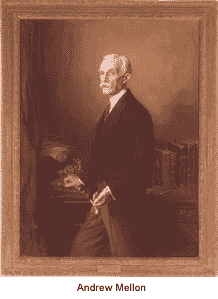Andrew William Mellon was born in Pittsburgh where his father was a lawyer, banker and associate of Henry C. Frick in the coke industry. Young Mellon graduated from Western University of Pennsylvania, later the University of Pittsburgh, in 1873 and joined his brother Richard in the timber business.
In 1874, the Mellon brothers merged their interests with their father’s, creating Thomas Mellon and Sons. Andrew Mellon emerged as the sole owner in 1882 and his father retired from the business four years later. A long line of diversified interests began in 1889 with the founding of the Union Trust Company of Pittsburgh and a later subsidiary, the Union Savings Bank.
 In succeeding years, Andrew Mellon used his talent for grasping new technologies to exploit interests not only in banking, but also in coal, shipbuilding, oil, locomotives, bridge construction, utilities, steel, insurance and aluminum. By 1902, he was president of what had become the Mellon National Bank.
During World War I, Mellon was active in his support of the American Red Cross and other patriotic causes.
The return of the Republicans to power in the postwar period brought Andrew Mellon an appointment as secretary of the treasury under Harding, a position he continued to hold under Coolidge and Hoover. While taking a progressive attitude towards industrial research, he also was a staunch advocate of such traditional conservative principles as tax reduction and the reduction of the national debt.
His views on the making of tax policy were formulated in his 1924 book, Taxation: The People`s Business:
In succeeding years, Andrew Mellon used his talent for grasping new technologies to exploit interests not only in banking, but also in coal, shipbuilding, oil, locomotives, bridge construction, utilities, steel, insurance and aluminum. By 1902, he was president of what had become the Mellon National Bank.
During World War I, Mellon was active in his support of the American Red Cross and other patriotic causes.
The return of the Republicans to power in the postwar period brought Andrew Mellon an appointment as secretary of the treasury under Harding, a position he continued to hold under Coolidge and Hoover. While taking a progressive attitude towards industrial research, he also was a staunch advocate of such traditional conservative principles as tax reduction and the reduction of the national debt.
His views on the making of tax policy were formulated in his 1924 book, Taxation: The People`s Business:
There is no reason why the question of taxation should not be approached from a nonpartisan and business standpoint. ... Tax revision should never be made the football either of partisan or class politics but should be worked out by those who have made a careful study of the subject in its larger aspect and are prepared to recommend the course, which in the end, will prove for the country`s best interests.
Wartime expenses had swollen the debt to more than $25 billion at the start of the Harding administration in 1921, but Mellon managed to pare it down to about $16 billion by the end of the decade. As secretary, Mellon was also an advocate of tariff reform and the creation of a federal budget system. Andrew Mellon supported such popular causes as payment of war debts owed to the United States by its former wartime allies. However, public attitudes toward the secretary changed rapidly after the stock market crash in the fall of 1929. Mellon became increasingly unhappy in office and in 1932 resigned to accept the ambassadorship to the Court of St. James in London. In 1935, Andrew Mellon was subjected to a lengthy Internal Revenue Service investigation, but was eventually exonerated. Mellon devoted much time and considerable sums of money to philanthropic causes. In 1913, he and his brother honored their father through the creation of the Mellon Institute of Industrial Research, an organization designed to forge a partnership between American scientific research and industry. In 1937, Andrew Mellon left a combined gift of $25 million to the people of the United States, part through the donation of his extensive art collection and the remainder in cash for the construction of what became the National Gallery of Art in Washington, D.C.